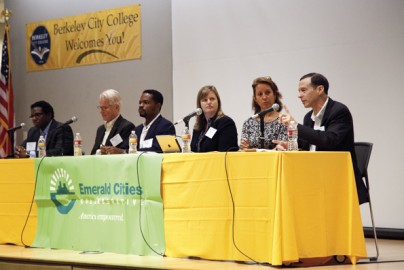Colleges seek sustainability

Berkeley City College hosted the Emerald Cities Initiative on Oct. 18 for the launch of their Community College Sustainable Development Program, a partnership between the collaborative and three urban community college systems throughout the nation that promote campus sustainability, community education, and other key factors in environmental preservation.
“Campus sustainability is at the core of what we want to accomplish,” Denise G. Fairchild, president and CEO of the Emerald Cities Collaborative, said.
The Emerald Cities Collaborative is a national network of nonprofit organizations working together to advance a sustainable environment. They have set out to create “Emerald Cities,” which are metropolitan areas set to achieve the lowest levels of toxic emissions and greenhouse gases throughout the nation. They have built a 23-campus initiative with city community colleges throughout the country, including City College.
“It is really great, at a time of diminishing resources that education is having, to see a project like Emerald Cities come up with this public/private partnership. It is a very positive development,” John Rizzo, president of the Board of Trustees at City College, said.
The collaborative feels it is vital to partner with community colleges to engage students and faculty in an effort to make campuses green and strengthen workforce development.
Interim President of Berkeley City College Dr. Deborah Budd explained their partnership with the the collaborative will lead to a partnership with local businesses and help shape the curriculum to better prepare students to enter the workforce.
“It is an incredible time to build these partnerships, and for community colleges to position ourselves as the anchor for the workforce developments,” Budd said.
Program participant Dr. Michelle Fox works nationally as the chief strategist for Education and Workforce Development at the U.S. Department of Energy’s Office of Energy Efficiency and Renewable Energy.
“Education and workforce training are facing critical challenges with unskilled workers,” Fox said. She emphasized the importance of “closing the gap between educators and employers” as well as improving training to adequately prepare students for the transition from the classroom to the workforce.
Fox hopes to incorporate new learning tools and technologies to reach these goals, as well as reduce the focus from state testing to the use of more meaningful, onsite assessments.
Local community colleges have already made great strides in creating environmentally sustainable campuses.
City College of San Francisco has a waste management strategy that promotes using less and recycling more.
“We are partnering with Emerald Cities to further these programs and our ecofriendly progress,” Peter Goldstein, Vice Chancellor of Finance and Administration at City College, said.
Color coordinated bins are placed throughout the campus for compost, recycling and waste. There is also a plan to reduce water usage and perform energy audits on the campuses to gauge energy usage, according to Rizzo.
“The environment and education are my two great passions, and I try to bring them to work hand in hand,” Rizzo said.
Berkeley City College has also made strides to be eco-friendly. They have an extensive curriculum in biotechnology and launched Green Career Pathways, “an Environmental Literacy learning cohort for disadvantaged students” between the ages of 18 and 24, according to Berkeley City College’s 2011-2012 Accomplishments website page.
“Green requires having a new vision to see how we can do things smarter,” Victor Flint, outreach coordinator at Berkeley City College, said. “If we don’t make choices now we will be left behind.”

Comments are closed.